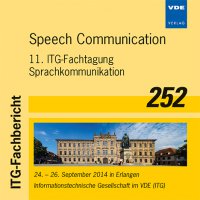Effects of Resampling in Acoustic Echo CancellationWith Static Nonlinear Loudspeaker Distortion
Conference: Speech Communication - 11. ITG-Fachtagung Sprachkommunikation
09/24/2014 - 09/26/2014 at Erlangen, Deutschland
Proceedings: Speech Communication
Pages: 4Language: englishTyp: PDF
Personal VDE Members are entitled to a 10% discount on this title
Authors:
Schalk-Schupp, Ingo; Faubel, Friedrich; Buck, Markus (Acoustic Speech Enhancement Research, Nuance Communications Deutschland GmbH, 89077 Ulm, Germany)
Abstract:
In modern acoustic echo compensation (AEC), nonlinear models are applied to mimic the loudspeaker’s behavior. Many conventional methods disregard the NYQUIST criterion when applying the model in the adaptation path. Higher harmonics caused by the nonlinear model are then aliased at the NYQUIST frequency, which introduces errors in the estimated signal. This paper investigates which amount of interpolation is needed to avoid this type of errors entirely. It turns out that if the echo path’s anti-aliasing filter is known, interpolation will yield lower error power up to an interpolation factor that depends on the highest frequency component in the reference signal and the highest-order harmonic created by the nonlinear mapping. The findings are supported by simulation results.


